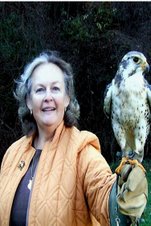Shortly before my departure, during a dinner shared with an old friend, I talked about the International Women's Conference and what I speculated about its intentions beyond "building bridges--breaking walls." (Like I said earlier, I am a sceptic by nature.) As soon as I began, or so I intended, to pay homage to the deep faith of many Muslims, my friend said dismissively, "Oh. Religious people." Now this old friend is an admirable person, a truly fine human being; but he is deeply secular. He knows little about Christianity or indeed any faith and approaches tidbits of religious knowledge in the way a child afraid of the water will dip a toe in a pool. Like many secularists in America today, my old friend is erudite and accomplished. He has a national reputation in his field; he is a mover and shaker in Democratic party politics and was, in a way, part of the Clinton administration. But he does not respect religious faith as a motivation for human action. Therefore, during our dinner hour, he was not curious about Muslim belief because, in his mind, it is an unpleasant topic. Well, in my mind this attitude is American know-nothingness--ignorant, parochial, and prejudiced. Ironically, because "prejudice" is one of the shibboleths of American culture today, sadly I go out of my way not to name my otherwise exemplary old friend.
I have been thinking about that dinner conversation in the light of my googling the IWF conference participants--an acquisition of knowledge that has made me rethink my own assumptions about the Muslim world, even after making my way through the conference's reading list. It turns out that I had several wrong-headed presumptions about these women with the strange unpronounceable names from the Middle East. First of all (the glory of Google to include pictures), these women dress like American lawyers--well, maybe some of them like your mother's Junior League--but they do not wear long skirts or head scarves. Oh, the silliness of my friend Clare and myself: emailing back and forth about what to wear, buying baggy gauzy trousers, worrying about our nail polish. At one point, I even bought at the Talbots Outlet a long black skirt and matching long-sleeved jacket that makes me look like Gertrude Bell.
More importantly, the Middle Eastern women coming to the conference are political liberals who are holding important positions in their increasingly-liberal countries. But we never hear about liberal Islam, do we? For the first time, I realize how skewed our media coverage in the U.S. is towards negative stories about the Middle East. Mary Ann Tetreault, writing about the democratic elections in Kuwait, puts it well: "Serious news about Kuwait rarely penetrates far beyond the region in the best of times. When the story is about democratization rather than invasion or terrorism, even the most encouraging of news can evaporate without a trace. Is this because, in Kuwait, democratization has been more the product of peaceful politics than violent confrontation? If so, it spells a cavalier attitude toward a wave of progressive political change that Americans and others are presumably in favor of seeing happen across the Middle East."
Therefore, we never hear about reformers such as Rula Dashti, political activist who helped secure the right to vote for women in Kuwait; Rima Khalaf Hunaidi, former deputy Prime Minister of Jordan, graduate of the American University in Beirut, PH.D. from Portland State University, creator of the Arab Human Development Report for the U.N.; Wijdan Talhouni Al-Saket, Jordanian Senator and president of the Jordan Forum for Business and Professional Women; Alees Samaan, first woman to chair a parliament in Bahrain; Farkhonda Hassan, professor of geology at the American University in Cairo and member of the second house of the Egyptian Parliament, who works to get more young women into the sciences in Egypt; Raghida Dergham, a political analyst for NBC, MSNBC and the Arab satellite LBC, as well as senior diplomatic correspondent for Al Hayat, the leading independent Arabic daily. All of these women, among others I have yet to google, will be at IWF Conference.
And yet these Muslim women know about us. Mary Ann Tetreault's observations during the Kuwaiti elections include the enthusiasm of the women to get out and vote in such numbers that the polling places were unprepared for handling the large numbers of illiterate women voters and the niceties of voter identification when the voter is veiled. "Consequently, the lines moved so slowly that some women gave up in disgust and went home without voting, eliciting several dark comments about Ohio in a line I stood in that day."
I am wrong about another assumption, one I stated in an earlier blog. The Middle Eastern women at the conference will not only be Muslims. Alees Samaan, mentioned above, from Bahrain, is a Greek Orthodox Christian Arab.
Note: Mary Ann Tetreault's "Kuwait's Annus Mirabilis" is wonderful reading. You can find her piece at MiddleEastDesk.org. She teaches at Trinity University in San Antonio.
Finally, my dinner companion is now working to raise money for Barack Obama. What a strange and wonderful world.
Subscribe to:
Post Comments (Atom)

No comments:
Post a Comment